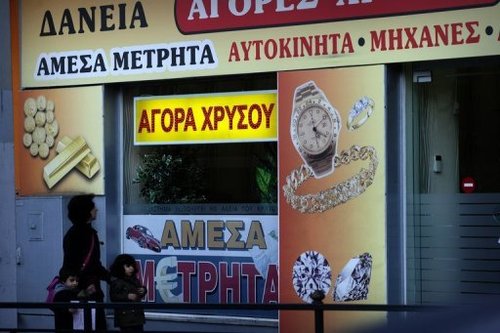AFP
Dec 11, 2011
Gold buyers tempt Greeks facing hard times
AFP
Dec 11, 2011
ATHENS - Greece has seen an upsurge in small companies and shops offering to buy gold, driven by record prices and the need many people have to raise cash during hard times when jobs are uncertain and money scarce.
 Details of the amount of gold bought, where it ends up or what profit is made are hard to come by (AFP, Louisa Gouliamaki) |
"Sell your gold," "We buy your jewels," the signs read in Ermou Street, a pedestrian precinct right in the heart of Athens thronged with people doing their Christmas shopping, as money changers and jewellers get in on the act too.
In recent months it has become common to have leaflets stuffed into your mailbox or handed out around the city, suggesting that Greeks might want to sell their old baptismal cross so they can afford their dream holiday.
Those buying the gold are often reluctant to talk to the press and in one small company office off the street, a worker says only that the owner is abroad and she has been told not to talk to journalists.
Details of the amount of gold bought, where it ends up or what profit is made are hard to come buy but Angeliki, who works in a jewellers, puts the margin at "between five and ten percent" while complaining about the stiff competition.
Angeliki, who did not want to be identified further, said shops elsewhere might do better, pointing to buyers who have set up in a run-down part of Piraeus, the port city of Athens.
Gold hit a record high of $1,921 an ounce in early September as nervous investors bought the precious metal as a safe hedge against the eurozone debt crisis which has spread remorselessly from its epicentre in Greece.
The price has fallen since then to around $1,700 but that is still very high compared with the historic range, making that old gold necklace or ring kept in a drawer surprisingly valuable.
GoldBuyers, which has opened several shops in and around the capital, plays up this angle.
"The gold price has risen 300 percent in the last five years," it says on its website, arguing that now is the time to sell before it falls again.
The Greek market gets an additional boost because the economy has been in recession since 2008 and as the government adopts stinging austerity measures to meet the terms of the country's EU-IMF bailout accords, times are only get harder.
Unemployment has risen sharply as a result of the cutbacks and lower pensions mean many people are finding it hard to make ends meet.
There "are two types of client," said one GoldBuyers employee.
"Those who are taking advantage of the rise in gold prices to sell some family jewelry to buy something else," such as the latest mobile phone, and then "there are those who have to sell because they need the money."
Angeliki says her clients come in to sell their gold crucifixes, baptism tokens or other religious objects along with watches and pieces of gold.
"When you are unemployed and have to pay the bills or taxes ... there is often no other solution," she said.
"I have seen some of them crying," Angeliki said, describing most of her clients as women aged 30 to 50 who sell their gold as a last resort and often unknown to their family.
On this afternoon, there is little business in her shop, which Angeliki blames on recent anti-austerity protests in nearby Syntagma Square putting people off.
At the same time, the authorities are beginning to show an interest in these small shops, with reports that they recently dismantled a network shipping gold to Germany and were also cracking down on tax evasion by them.
by Eve Szeftel
Copyright © 2024 AFP. All rights reserved. All information displayed in this section (dispatches, photographs, logos) are protected by intellectual property rights owned by Agence France-Presse. As a consequence you may not copy, reproduce, modify, transmit, publish, display or in any way commercially exploit any of the contents of this section without the prior written consent of Agence France-Presses.

























